
We speak with United Nations expert Francesca Albanese, one day after the Trump administration announced it is imposing sanctions on her over her advocacy for Palestinian rights. Albanese has served as the U.N. special rapporteur on the Occupied Palestinian Territory since 2022. She recently released a report highlighting dozens of companies aiding Israel’s occupation of Palestinian territory and fueling its genocidal war machine in Gaza, including U.S. tech giants. Secretary of State Marco Rubio characterized Albanese’s work as “political and economic warfare” against the United States and its allies.
“It seems that this administration is quite allergic to justice,” says Albanese, speaking to Democracy Now! from Slovenia. “It’s trying to distract us from where our focus should be: What’s happening to the Palestinians in the little that remains of their tormented land, the Gaza Strip, the West Bank and East Jerusalem.”
Transcript
AMY GOODMAN: This is Democracy Now!, democracynow.org. I’m Amy Goodman, with Nermeen Shaikh.
NERMEEN SHAIKH: The Trump administration has imposed sanctions on United Nations special rapporteur for Palestine Francesca Albanese over her report naming dozens of companies she says are profiting from Israeli occupation and genocide in Gaza. Secretary of State Marco Rubio announced the sanctions in a social media post Wednesday, stating, quote, “Albanese’s campaign of political and economic warfare against the United States and Israel will no longer be tolerated,” Rubio wrote. Amnesty International blasted the sanctions as a, quote, “shameless and transparent attack on the fundamental principles of international justice.”
Francesca Albanese will join us in a minute. The sanctions were filed after she gave a presentation last week to the United Nations Human Rights Council in Geneva and called on states to impose an arms embargo and cut off trade and financial ties with Israel, which she alleged was, quote, “responsible for one of the cruelest genocides in modern history.”
FRANCESCA ALBANESE: If the genocide has not stopped, it’s not just because there was an — there has always been an economy of the occupation. It’s because the economy of the occupation has turned into an economy of genocide, and so there have been people and organizations that have profited from the violence, the killing, the maiming, the destruction in Gaza and in other parts of the occupied Palestinian territory, because it’s not that the Palestinians in the West Bank and East Jerusalem are having the happiest time of their life as we speak. In the past 20 months, while the Israeli army, and accompanied by settlers, was devastating Palestinian lives and landscapes, the Tel Aviv Stock Exchange soared by 213%, amassing over 220 billions in market gains, including 76.8 billion U.S. dollars in the past month alone. So, clearly, for some, genocide is profitable.
AMY GOODMAN: For more, we’re joined by Francesca Albanese herself, the U.N. special rapporteur on the occupied Palestinian territory. Her landmark report is headlined “From economy of occupation to economy of genocide.”
Francesca, we last spoke to you in our New York City studio. You’re now in the capital of Slovenia. You’ve just held a news conference. This news has just come out in the last day that the U.S. is going to sanction you, the U.N. special rapporteur on the occupied Palestinian territory. Trump has already sanctioned top International Criminal Court officials, like the ICC chief prosecutor Karim Khan. The ICC has come out with an arrest warrant for both Israeli Prime Minister Netanyahu and the former Israeli defense minister. Can you respond to the sanctions against you and what they mean?
FRANCESCA ALBANESE: Hi, Amy. Hi, Nermeen. Thank you for being — for having me with you.
What I respond, it seems that this administration is quite allergic to justice, isn’t it? I woke up this morning. I could take my shower. I could talk to my kids. I could meet the wonderful people of Slovenia, institutions and ordinary citizens alike, without the sound of drones. Yes, I skipped breakfast, but I chose it. I was not starving. I’m not starving. And this is the situation of the people of Gaza. This is what we need to talk about, because what the U.S. is doing — I mean, people can make their own assessment of it — is distracting us, is trying to distract us from where our focus should be: what’s happening to the Palestinians in what remains, the little that remains, of their tormented land, the Gaza Strip, the West Bank and East Jerusalem.
NERMEEN SHAIKH: And could you talk, Francesca, about the fact that this announcement came on while Netanyahu is in Washington, D.C., in fact, his third visit to the United States since Trump came into office in January?
FRANCESCA ALBANESE: Yeah, in fact, I should correct it. It’s not that this administration is allergic to justice. It’s attracted to injustice more than justice, because the ICC-wanted-for-war-crimes-and-crimes-against-humanity Benjamin Netanyahu doesn’t belong to Washington, D.C. He belongs to The Hague or anywhere else where he can be prosecuted, as the ICC has requested.
Look, I’m more than — I mean, I know the United States is not a member to the Rome Statute, has imposed the sanctions on the ICC. And technically, the argument to impose the sanctions against me is that I cooperate with the ICC. Surely so, like anyone who wants justice. The ICC is based on the Rome Statute. And I’m a proud Italian, happy that it was my country and the capital of my country to give the name to the statute of the International Criminal Law Court, that is — I mean, this is also the legacy of World War II and the Holocaust. Universal justice starts with that. So. look at the paradox. But again, I’m more horrified that my own country, Italy, and Greece and France, three member states of the Rome Statute, allowed ICC-wanted-for-war-crimes-and-crimes-against-humanity Benjamin Netanyahu to fly with his airplane toward Washington, D.C., over their soils, because this is unacceptable. They should have not given concession — such a concession. He must be arrested.
NERMEEN SHAIKH: So, Francesca, let’s go to your report, the U.N. report, “From economy of occupation to economy of genocide.” When we had you on earlier this year — sorry, last year in October, you were working on a report. The report had just come out on “Genocide as colonial erasure.” You’ve also issued another report, “Anatomy of a genocide.” So, explain why and when you moved your focus to the economic beneficiaries of what’s been happening in Gaza.
FRANCESCA ALBANESE: Yeah, look, I decided to investigate the private sector in February 2023, when I went to Norway, and for the first time I saw what many had already been investigating and denouncing — the BDS movement, Don’t Buy into Occupation, Profundo, SOMO, Who Profits — the fact that there were people making business in the — you know, in the system, within the system of the military occupation that Israel was maintaining over the occupied Palestinian territory.
Now, really, as someone has said, only a lawyer can take ages to realize the economic, the political economic — economics of the occupation. But, however, times — I mean, two years later, I was into the investigation of all the companies that I had started to collect information about, two years later, because in the middle was a genocide. I needed to make sense of the military assault that since October 2023 Israel had launched against the Gaza Strip, while also accelerating the annexation and the ethnic cleansing in the occupied West Bank and East Jerusalem.
And as I collected, together with my team and all the actors that contributed, the lawyers, investigative journalists and others who contributed to the acquisition of information, that I verified, to the setup of a database of 1,000 entities, of which I just collected those eminent cases that help illustrate the system. So, Amy, my report is not to be read as a duplicate of the database that the U.N. has set up years ago and is updating. It’s illustrative of a system, an economy of occupation. Israel would have not been able to maintain the military occupation without the support, the means, the weapons, the machinery, the technology, the legitimacy that has come, including from the pension funds, including the Norwegian pension funds, the —
AMY GOODMAN: Francesca —
FRANCESCA ALBANESE: — legitimacy of the universities, and so on and so forth.
AMY GOODMAN: I want to go to last month. Norway’s largest pension fund, what you’re referring to, known as KLP, announced it would no longer invest in two companies that sell equipment to the Israeli military, the pension fund managing the savings of about 900,000 Norwegian municipal workers. Democracy Now! spoke to Kiran Aziz, head of responsible investments at KLP, about how they came to the decision.
KIRAN AZIZ: KLP, as Norway’s largest pension company, has decided to exclude companies Oshkosh Corporation and ThyssenKrupp, due to their sales of weapons to the Israeli military. KLP learned from a report conducted by the U.N. High Commissioner on Human Rights that several companies were supplying weapons or equipment to the Israeli Defense Force, and these weapons are being used in Gaza. On the basis of this information, KLP has done a thorough assessment of the companies, but also engaged in dialogue with them in order to understand what kind of due diligence they have performed. And like in all other situations, companies have an independent duty to exercise due diligence in order to avoid complicity. But based on our assessment, these companies have failed to demonstrate any due diligence at all, and these companies are also having a long-standing collaboration with the IDF, and weapons deliveries have continued after the outbreak of the war in Gaza. Exclusion is an important tool for us to reduce KLP’s association with unacceptable conditions that are ongoing or likely to occur in the future. But exclusion is also a way to hold companies accountable, because we all need to respect international law and humanitarian law.
AMY GOODMAN: So, that was Kiran Aziz, head of responsible investments at KLP. Meanwhile, one of the world’s largest shipping companies, Maersk, has recently announced it will divest from companies linked to illegal Israeli settlements in the occupied West Bank, following a sustained pressure campaign called “Mask Off Maersk,” that was led by Palestinian Youth Movement. This is Nadya Tannous, international coordinator of the campaign.
NADYA TANNOUS: Yeah, this is a huge win for the movement. Maersk is the Danish logistics giant. They’re one of the largest companies on the planet. And they are the first logistics company ever to cease transportation of settlement goods, all settlement products into the Israeli settlements and out of the Israeli settlements. I think that this is a large step, a first step, to isolating the Israeli settlements from the global economy, which decreases their ability to terrorize the Palestinian people, to annex more land and to continue to break international law. We also were able to ascertain this win, not because we demanded divestment from the settlements, but because we lifted the political ceiling and we demanded a people’s arms embargo. Maersk is still complicit in the transshipment of arms and weapons components, of military cargo to the Israeli Ministry of Defense. They’re endemic to the supply chain of the F-35 bomber, which is one of the most expensive and deadliest weapons on the market. And that’s why Maersk, this news, came the same week as the Francesca Albanese report, which details at length multiple corporations that are complicit in the genocide of the Palestinian people and profiting off of that genocide. Maersk is one of them.
AMY GOODMAN: So, that’s Nadya Tannous of the Palestine Youth Movement. Francesca Albanese, as you listen to both women, from Norway and taking on the Danish company Maersk, if you can talk about the other companies that you’ve been targeting, and if these U.S. sanctions are going to change your approach?
FRANCESCA ALBANESE: You know, let me share an anecdote, because this is really telling. I’ve been engaging with a major newspaper who refused to report on my report because it was not accurate. And, I mean, it was not accurate, not solid enough, not solid enough, because I had used as a source this particular report, the work that this Youth Movement has done. And you see the condescending attitude of the West and the saviorism that we carry. The Youth Movement is associated with lack of expertise. I’m so glad that the world is changing, and we are in the hands — with this young generation, we are in better hands.
What I want to reflect on, as listening — as answering your question, Amy, is something that Nadya said, meaning it’s the endemic, that there are certain services that companies are providing that go to something that is endemic to the illegal occupation, to the apartheid structure that Israel has maintained over the years over the Palestinians, and now has even turned genocidal. And it’s the fact that when people have concentrated their attention, without any result, on settlements — settlements are clearly at the heart of the problem, but they’re entrenched in the Israeli system. The universities have been legitimizing and giving even means. They’ve been transferring funds and endowments to the Israeli occupation and very ideology of erasure of the Palestinian people. This is why I say there is no neutral sector when it comes to — when it comes to Israel as the state, which has maintained for 57 years an unlawful occupation. And when you look at the water sector, the electricity, for example, there is one grid. There is one way of exploiting, extracting and exploiting Palestinian resources, and then depriving the Palestinians of them.
This is why today I do not call for sanctions on individuals and on companies producing in the settlements. This is the past century. This is the old Bible. This is what we have to do today, is to act like intelligent people and realize that if Israel is accused in different international proceedings of war crimes, crimes against humanity and even genocide, it’s Israel as a state which is to face the consequences, including sanctions and cutting economic ties with Israel as a state.
NERMEEN SHAIKH: So, Francesca Albanese, we just have 30 seconds, but if you could talk about — and then we’ll continue with you after the program for a taped show. If you could say to what extent you were inspired by the divestment campaign against apartheid South Africa? You spoke about that at the U.N.
FRANCESCA ALBANESE: Certainly, I was, of course, but not — I mean, not much. I was more inspired — I mean, not that I was not inspired. It’s just that what led me was the need to understand the occupation and the apartheid, and then the campaign made sense to me against apartheid South Africa and against apartheid Israel. Takes time to a lawyer.
AMY GOODMAN: Francesca Abanese, we want to thank you for being with us. Please stay with us. We’re going to do a post-show, a web exclusive, post it at democracynow.org. U.N. special rapporteur on the occupied Palestinian territory. We’ll link to your report, “From economy of occupation to economy of genocide.” She was speaking to us from the U.S. first lady’s, Melania Trump’s country, Slovenia. I’m Amy Goodman, with Nermeen Shaikh.

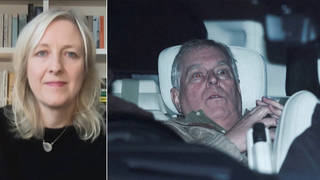
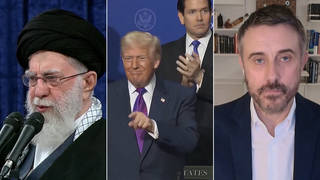
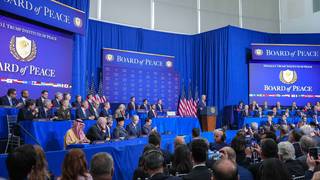
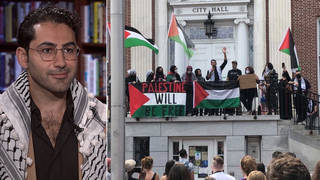






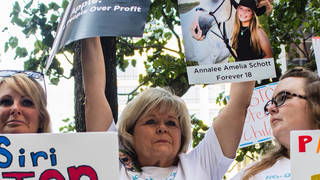
Media Options